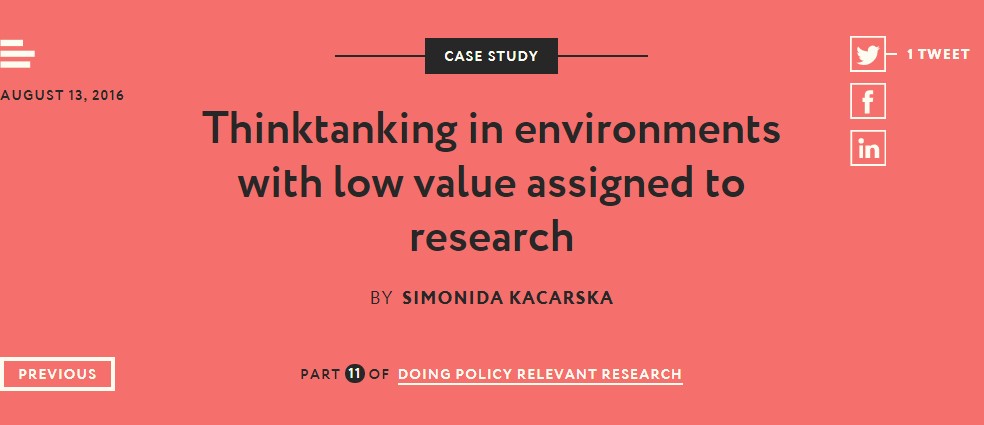Author: Simonida Kacarska
 Doing research for a think tank or a civil society organization in the Balkans on issues of democratic governance, I have found myself, at various times, wondering about local understandings of research and its value. While debates on evidence-based policymaking have been transposed from Western Europe to our region, the process of getting evidence, usually framed as research, has been marginalized. Moreover, in the national and regional circumstances of deficient and largely non-existent policy consultation processes, the overall value of research is considered low. This low assigned value is also reflected in the lack of national funds for supporting research and the reliance of think tanks on donor-funded short term projects. These factors create significant interrelated challenges for the functioning of think tanks in terms of research planning, possibilities for conducting quality research as well as in promoting the value of research in their respective societies
Doing research for a think tank or a civil society organization in the Balkans on issues of democratic governance, I have found myself, at various times, wondering about local understandings of research and its value. While debates on evidence-based policymaking have been transposed from Western Europe to our region, the process of getting evidence, usually framed as research, has been marginalized. Moreover, in the national and regional circumstances of deficient and largely non-existent policy consultation processes, the overall value of research is considered low. This low assigned value is also reflected in the lack of national funds for supporting research and the reliance of think tanks on donor-funded short term projects. These factors create significant interrelated challenges for the functioning of think tanks in terms of research planning, possibilities for conducting quality research as well as in promoting the value of research in their respective societies
First, as mentioned above, given the nascent and rudimentary understanding of the policy process, meaningful discussions and consultations are often lacking. This strips the think tank community from one of its main working tools. The declaratory support for using research in shaping policies is ultimately not reflected in practice with policy planning regularly the missing step from the policy cycle, making it increasingly difficult for thinktankers to plan their research agendas.
Policy proposals come in a take-it-or-leave-it form, without any assessment of impact and are usually put up (if at all) for consultation in excessively short deadlines. In such circumstances, the role of thinktankers in policy is reactionary and limited to fixing patches instead of engaging in policy development and/or improvement.
This brings me to my second point of planning a reasonable research agenda at the outset of the internal think tank cycle as well as coordination with ongoing (international donor-supported) projects. Given the lack of research-oriented funding it becomes vital for think tanks to streamline as much as they can their research agendas in projects. In the five years of our think tank’s (the European Policy Institute, in Macedonia,) existence we have come to the painful realization that research is also not attractive to the biggest regional donors as they expect the groundwork and impact within excessively short periods of one year, or even less. At the same time, as any think-tanker knows well: research takes time, money and skills, which rarely coincide with the life span of a typical project (read: 12-18 months).
Given what was said above, as thinktankers in developing regions, we are left arguing that research is important to policy, while in the background implementing short term projects to sustain our everyday operation. Research in these projects usually takes a back seat at the expense of capacity building or similar activities with a perceived immediate impact (by the funders). In this type of compromise, we run the risk of perpetuating and even supporting the already prevalent societal attitude that research is in fact of low importance or that it needs to be done quickly.
Moving beyond this situation requires a conscious effort on behalf of think tanks of educating both their constituencies and their supporters/donors of the value and need for quality social research. This is not an easy task since the traditional hubs of research such as universities and academia more broadly are also not research-oriented (this also being a result of the non-existent national funding for research). Hence, in order to be able to advocate on their niche (thematic) work, think-tankers need to raise the value awarded by society to research in general, especially among the policymakers, but also among donors.
Working towards such a change requires us to go a step back from our usual work and initiate broader discussions on why (at all) we need research or whether and how we can use it as a society (instead of using purely policy jargon).
This type of discussion is needed in the national policy and donor communities in order to raise the value of research beyond the declarative recognition of its importance. The desired impact of such discussions would be an extended policy planning phase creating an effective demand for evidence coming from research, thus remedying the deficiencies mentioned above. While I recognize this would not be an easy or a quick task, it would make life easier both for the policy community but think tanks themselves as well. Such a move would nevertheless require recognition from donors that research is valuable and would presuppose a change of the paradigm of short term impact towards long term benefits for the community, reflected in funding strategies for think tanks as well.






